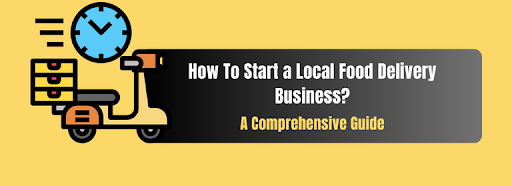How to start a local food delivery business


In recent years, the food delivery industry has seen a huge increase in demand, owing to busy lives, the convenience of ordering meals online, and the advent of on-demand services. Starting a locally-based food delivery service can be a rewarding and potentially profitable effort if you're considering entering this dynamic market and have a passion for food. We'll walk you through the procedures and techniques required to successfully start a locally-based food delivery business.
Table Of Contents
- Niche Identification
- Examining the Competition
- Developing a Business Plan
- Legal Prerequisites and Permits
- Buying from Local Restaurants
- Developing an Online Platform
- Creating Delivery Logistics
- Driver Recruitment and Training
- Branding Your Company
- Strategies for Digital Marketing
- Collaborations and Partnerships
- Loyalty Programmes for Customers
- Order Precision and Timeliness
- Customer Service
- Mechanisms of Feedback
- GrubHub
- DoorDash
- Uber Eats
1. Market Research and Planning
Niche Identification
It is critical to determine your specialization before entering the food delivery sector. This could be based on the type of food you wish to specialize in, your target demographic (for example, health-conscious clients, families, or students), or a specific geographic area within your city. Conduct market research to determine the level of interest in your selected area and customize your offers accordingly.
Examining the Competition
Examine your local competition. Is there already a food delivery service in your area? Examine their advantages and disadvantages, pricing tactics, and client feedback. Identifying market gaps might help you position your company uniquely.
Developing a Business Plan
Create a detailed business plan outlining your business model, revenue predictions, marketing approach, and financial needs. A well-thought-out plan will act as your road map and make obtaining money easier if necessary.
Legal Prerequisites and Permits
Obtaining the necessary permits and complying with local laws is crucial. Examples of these permits include health department certifications, food safety permits, and insurance. It's advisable to discuss this matter with legal and financial professionals to ensure your company operates within the boundaries of the law.
2. Establishing Your Operations
Buying from Local Restaurants
Form relations with local restaurants to give a wide menu variety. Negotiate mutually beneficial agreements with these businesses to ensure that they can handle higher orders during busy hours.
Developing an Online Platform
In today's digital world, customers must place orders through a user-friendly and responsive website or mobile app. Collaborate with an experienced food delivery app development team to construct an easy-to-use platform that accepts online payments.
Creating Delivery Logistics
Effective delivery logistics are critical to success. Consider investing in a dependable fleet of delivery vehicles or outsourcing delivery services. To ensure on-time deliveries, use GPS tracking and route optimization.
Driver Recruitment and Training
Recruit a team of dependable drivers, do background checks, and teach them safe and courteous delivery procedures. Excellent client service is critical, so make sure your drivers are positive representatives of your brand.
Marketing And Branding
Branding Your Company
Make your brand identity stand out by reflecting your local focus and values. A memorable logo, brand colors, and a compelling mission statement can all assist in distinguishing your company.
Strategies for Digital Marketing
Utilizing digital marketing channels such as email marketing, social media, and more importantly mobile app marketing. Getting help from a mobile app marketing service can make your business much more successful by reaching more people and getting noticed.
Collaborations and Partnerships
Expand your reach by collaborating with local businesses, influencers, and event organizers. Hosting pop-up events, sponsoring community activities, or collaborating with local food festivals can all help to increase brand awareness.
Loyalty Programmes for Customers
Implement loyalty programs or discounts to encourage repeat business. Customers who order frequently should be given special discounts or offers.
Customer Satisfaction and Quality Control
Order Precision and Timeliness
Maintain high order accuracy and delivery time criteria. Consistency in these areas will result in happy clients and positive feedback.
Customer Service
Provide accessible customer service via phone, email, or live chat to respond to inquiries, issues, or complaints as soon as possible. Customers that receive exceptional customer service are more likely to become repeat customers.
Mechanisms of Feedback
Customers should be encouraged to offer feedback and reviews. Utilize this useful data to find areas for improvement and to adapt to changing customer preferences.
Some Of The Case Studies That Prove The Success Of Local-Based Food Delivery Businesses
GrubHub
GrubHub is one of the major online meal delivery platforms in the United States, having started in 2004. The company's success is due to its extensive network of local restaurant partnerships and easy-to-use software.
DoorDash
DoorDash Founded in 2013, DoorDash focuses on last-mile food delivery and offers a variety of innovative features, such as its membership service, DashPass, which gives free delivery and savings.
Uber Eats
Uber Eats, a ride-sharing service extension, has quickly established itself as a prominent player in the food delivery sector. Uber Eats makes use of the current Uber driver network and app to provide a streamlined experience.
Investigate and learn from local meal delivery companies in your area. Many great businesses began small and grew via efficient local marketing and exceptional service.
Conclusion
Starting a local food delivery business involves careful preparation, perseverance, and a passion for providing exceptional service. You may set a solid foundation for your firm by completing rigorous market research, establishing efficient operations, executing strategic marketing, and emphasizing customer experience. Food delivery is a competitive industry, but with the correct approach and a distinct local focus, your business may succeed
Remember that success will not come easily, but with perseverance and a customer-centric attitude, you can develop a rewarding and profitable food delivery service in your community. If you have any questions or need further guidance, please feel free to contact us.

The Author
Gopinath Murugaiyan
Managing Director




